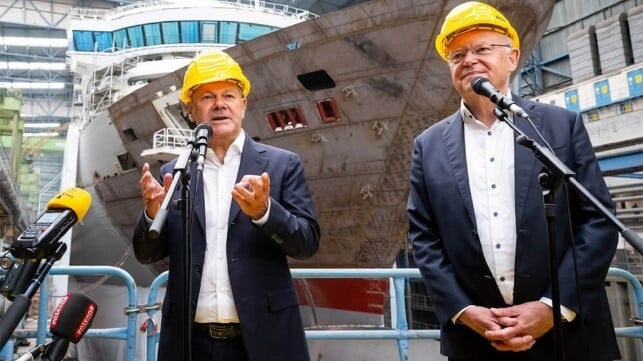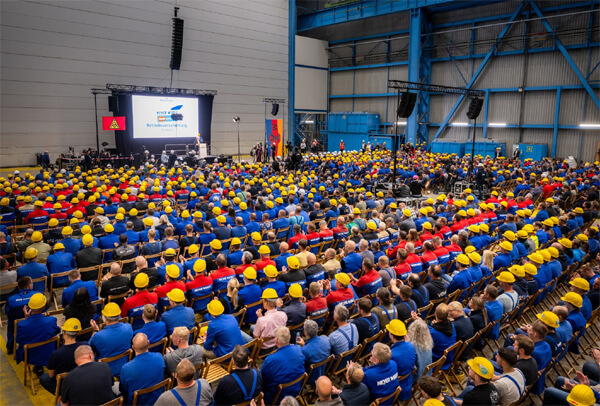German Chancellor Visits Meyer Werft Signaling Support for Bailout

Financially troubled German shipyard Meyer Werft received assurances of a government-supported bailout during a town hall meeting for employees with German Chancellor Olaf Scholz and Lower Saxony’s Minister President Stephan Weil. While cautioning that the deal is not yet done, the government officials emphasized the importance of the jobs and their commitment to the company and its employees.
“The way has now been paved for the start of the restructuring and securing the future of the shipyard,” CEO Bernd Elkens and restructuring expert Ralf Schmitz told employees after meeting with the chancellor and local government officials. They said they would be following the roadmap from Deloitte’s recently presented restructuring report and would be clarifying details of the agreement with the commercial banks.
Government officials however emphasized that the final deal also requires the support of the budget committee of the Bundestag (the German federal parliament) as well as the Lower Saxony state parliament. The deal must also be structured in a form that will be approved by the European Union.
Meyer Werft’s problems are not a shortage of orders, but a financial shortfall and inability to finance future constructions. The company has 10 large cruise ship orders, including five new orders for Disney and its Japanese affiliate as well as two recent orders for Carnival Cruise Line, as well as work on a research vessel and four offshore converter platforms for the offshore wind energy industry. Media reports are saying the company booked approximately $12.3 billion in recent orders due for delivery till 2029.
The cruise lines reportedly pay 20 percent of the cost of the contract upfront and make the bulk of the payments when the ships are delivered several years later. The company took a loss on some of its recent projects due to increased labor and material costs after the pandemic and due to the war in Ukraine. Banks have been unwilling to finance the new construction without loan guarantees and are also calling for increased capital to help offset the recent financial losses.

Schulz told employees he understood the pressures created by the financial uncertainties while saying the government stands with the shipyard (Meyer Werft)
Meyer Werft in Papenburg is a major employer with Scholz emphasizing the critical importance of the maritime industry to Germany. He called the shipbuilder the “crown jewel,” for Germany in the industry. Around 3,300 people currently work at the Papenburg yard with Meyer employing as many as 7,000 with its other shipyards in Rostock (Meyer Neptun) and Finland (Meyer Turku). As many as 18,000 jobs are also associated with the yard from suppliers and contractors.
The terms remain to be set but Meyer is reportedly looking for as much as $2.5 billion in loan guarantees to finance the construction projects. In addition, the banks are reportedly demanding as much as approximately $450 million in new equity. German media is reporting the proposed terms call for the federal government and the Lower Saxony state to each provide approximately $1 billion in loan guarantees as well as making the capital infusion. In exchange, the government would receive a majority ownership stake possibly as high as 80 to 90 percent of the Meyer.
Members of the federal parliament are already saying the deal must be structured with a clear exit path for the government as well as a timeline. Some reports suggest the guarantees would only carry the company to 2027 but give the Meyer family the first option to reacquire the company. Commentators point out that a similar deal was created during the pandemic for Lufthansa and the government made a profit selling the shares.

that matters most
Get the latest maritime news delivered to your inbox daily.
Meyer has previously said it faces a mid-September deadline to resolve its current financial crisis. In July, it reached terms with the unions to establish a works council and supervisory board, the standard structure for German companies. Meyer Werft had moved its corporate headquarters to Luxemburg but agreed to bring them back to Germany. In exchange, the unions agreed to a plan to reduce headcount by 300 employees first through voluntary efforts or in 2025 through layoffs.
Meyer remains one of the leading shipyards in the world for building large cruise ships and the pioneer in LNG-fueled cruise ships. For the mega-ships only Fincantieri and Chantiers de l’Atlantique have been traditional competitors but China is also working to enter the market after having built its first domestic cruise ship and currently enhancing processes as it builds its second cruise ship.
